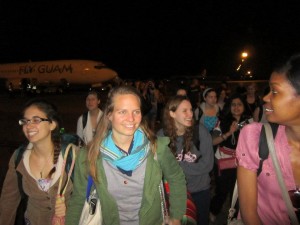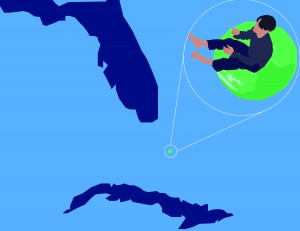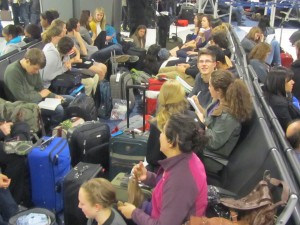Would YOU Leave?
April 27, 2012 by emlansdale
As I wade through the memories and reactions to our time in Cuba, it already seems so far away, not only geographically but like a long past century. The only way I can feel like I’m back in that place of adventure, confusion, curiosity, and enlightenment is through reading my journal and listening to the music that infused our travels. Therefore, this reflection is going to be shaped by excerpts from my journal and the words of the Cubans who let me into their lives.
The night of arrival, 2:30 a.m.: The heat envelopes me like a fog as we descend the airplane stairs to the tarmac. We twirl and rejoice in the authentic night, pointing excitedly at our first picture of Che, observing beneficently from a nearby plaster wall. I sneak into the crowd outside the airport doors, smiling and craning my neck expectantly every time the doors slide open. The anticipation is tangible and my eyes fill, overcome with relief when a mother and daughter embrace, sobbing silently. Fathers, cousins, friends…the crowd sings, chatters, and takes swigs of a strong smelling alcohol as we wait—I’m back in a feeling showing, and loving culture.
Those strong emotions I felt for complete strangers stayed with me throughout our first days in Cuba. I wanted to understand why they would leave a country they so clearly loved, people they so clearly cherished, and a culture so much more open, warm, and generous than ours. I made it a goal to ask every Cuban I met a simple question: If you could leave the country tomorrow would you go? The answers I got were far from simple. Here are some of them; many are paraphrased as they were longwinded.
- Lazaro, middle aged gardener at the ICAP mansion: I migrated here from Pinar de Rio because there is more money here. I have a cousin in Arizona; do you live near there? I’d like to go visit, but I don’t speak the language and I’d never get a Visa. Being in Havana is already far enough from my family.
- Saydi, 19 yr. old dancer from Havana, one of our salsa teachers: No, I love my job. I’ve been dancing since I was 5 in a street parade and now I have a job at the Las Vegas Cabaret and here. My father works on a cruise ship and I never see him; I don’t want that for my family.
- Yasmani, 24 yr. old jeweler in Havana, we met at a bar on Obispo: My brother works here with tourists and that’s the only reason I’m here drinking a mojito with you. I earn 12 pesos (50¢)/day as a jeweler. It’s not fair that I can’t earn a decent living as a professional; I would definitely leave given the chance.
- Adrian, 25 yr. old bicitaxi driver from Havana: I want to visit other countries like you are doing here, so yes I would leave, but not to live forever.
- Endy, middle aged barber in Havana: I wouldn’t leave Cuba.
- Mayda, 52 yr. old doctor, we met at Rancho Luna Resort: Yes, I want to move to the US to be with my daughter. She paid for us to celebrate my birthday here. My grandson, Brian, lives with me now and he can’t visit his parents because he’ll lose his Cuban citizenship. It’s so sad, I don’t want us to lose our citizenship, but I want him to grow up with his parents and newborn brother.
- Salek, in his 20s musician/magician in tourist industry in Trinidad: It depends on the country.
- Unnamed Magician in Trinidad: I would leave to work, but not to live. You have to return every 11 months to maintain citizenship.
- “Negra”, 20 yr old mother, sells baked goods out of a private home: I would go to another country if given the opportunity. You don’t see the fruits of your labor here. My husband makes 315 pesos ($12.50)/month as a trucker and he’s gone almost all the time.
- Jhan, in his 30s, drummer in a band for tourists in Trinidad: I definitely wouldn’t leave. The inspiration for my music is in my blood. I’m Cuban.
- William, 26 yr old bartender in Veradero resort: I wouldn’t leave. I’m building my dream house here little by little. I live with my parents now, but I’m making enough money to have my own life very soon.
- Yoel, 36 yr old tour guide: I’ve already been to many countries! I must stay here to start Joe’s Travel Agency.
- Ariam, in his early 20s studying piano at the Instituto Superior de Arte: I couldn’t tell you. Many people leave due to living conditions here, but I don’t know. It would depend on many factors. Today I’m here talking to you, but tomorrow I could be leaving the country. There’s nothing left to do except live in the moment.
It’s hard to extract cold numbers from these interviews. For example, I counted people like Adrian and the magician who wanted to visit other places, but not live as a “NO” because that’s not really plausible in Cuba at this time. So, subject to my discretion here are the results:
NO: 8
YES: 3
MAYBE: 2
These are interesting numbers considering the general sentiment in the US that all Cubans want to leave their country. I was surprised at these numbers because most Cubans I talked to expressed discontent with their living standards; apparently not enough to want to abandon their county. What isn’t surprising is the fact that so many foreigners believe all Cubans want to leave. Stories of Cubans dying at sea while trying to cross the two hundred miles between Cuba and Florida are well known in the US, helped along by the documentary “Balseros”. This illegal form of crossing by whatever means has largely been abandoned, but Cubans still seek to immigrate to the US. In 2000, the Census reported over seven hundred thousand Cubans living in Miami alone. The overall Cuban population in the US rose from 1.2 million in 2000 to 1.8 million in 2010. However, I’m less concerned with how many Cubans immigrate but instead why they choose to go. Why did so many of the Cubans I talked to during our trip say they would not leave? How are the motives for immigration today different from those ten, twenty, or fifty years ago?
Sociologists Eckstein and Barberia argue that we have to take into account contextual and historic factors when analyzing immigrant adaption, not simply generations or number of years they’ve been in a country. If we separate the two main “cohorts” of immigrants into the politically driven exiles from the Revolution up until the Special Period and the more economically driven immigrants of the past two decades, their motives are just one layer of difference. Ties to family in Cuba, intentions of permanence and integration in US society, and the types of people leaving are just a few of the other layers present in this complex process. Unlike the first émigrés after the Revolution who left Cuba because they didn’t agree with Castro’s plan for the country, many immigrants today leave for purely economic reasons while maintaining support for Castro, the Revolution, and Cuban ways of life in general. This idea is greatly reflected in my discussions of immigration with Cubans. Adrian, Yasmani, and “Negra” all expressed interest in immigrating for economic reasons, but also in coming back to Cuba to spend their money. Among younger Cubans (early 20s), this seemed to be a common response. In contrast, older people like Mayda and Lazaro stated familial reasons as the primary reason they would leave Cuba.
Eckstein and Barberia suggest that increased communication, lack of ideological opposition, and the diminishing of fear and cultural constraints on travel have helped create this new idea of temporary migration. Furthermore, travel barriers have become harder to enforce and increased tourism has given Cubans another economic option. Transnational ties among the second cohort of émigrés are much stronger than the first wave because the first wave did not visit the island as much and most of their family now lives in the US. According to the article, most of the leading elite in Florida are members or children of that first wave of post-revolutionary immigration, giving them vested interest in the Cuban American community. Meanwhile the second wave are creating a new type of Cuban-American; “they are creating a transnational, increasingly borderless social, cultural, and economic field and, in so doing, generating unintended consequences at the family, community, and macro levels. Cubans who do not emigrate, as well as those who do, are changing in the process” (833). This process of change is clearly visible in my conversations with a diverse selection of Cubans. Ariam’s unsure and confused response as well as many of the others’ conditional decisions show the complicated cultural, political, and social hurdles that have to be confronted when deciding to leave such a special country.
I can’t pretend to understand any better why Cubans come and go, but I feel the ever present pain of the reality of so much immigration. During our talk with the Cenesex representative, he mentioned that Cubans have shown high levels of self-worth. A question I’d like to further explore is how Cubans are translating this identity into a transnational network of movement. I caught a glimpse of this in that first Cuban experience, the dramatic and emotional scene in the airport, which now stands in stark contrast to our return to the US.
Last Day, Miami Airport: The Miami airport felt so abundant and luxurious, teaming with overly equipped and provided for people, too much food, and so much sound. Life, technology, privilege is so stingingly present. Anna y yo had our last comida cubana (ropa vieja con arroz morro y platano) in La Carreta Restaurant. Ciao Cuba—que viva!
Eckstein, Susan; Barberia, Lorena. Grounding immigrant generations in history: Cuban Americans and their transnational ties. The International Migration Review 36.3 (Fall 2002), Sociological Abstracts.
United States Census 2010. “2010 Census Shows Nation’s Hispanic Population Grew Four Times Faster Than Total U.S. Population.” Web. April 26 2012. <http://2010.census.gov/news/releases/operations/cb11-cn146.html>
Leave a Reply
You must be logged in to post a comment.



